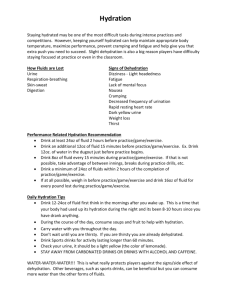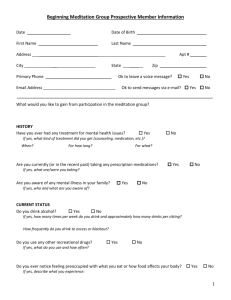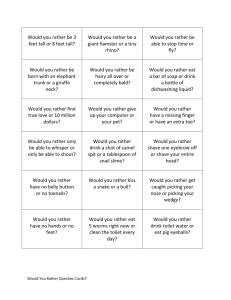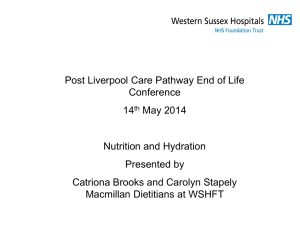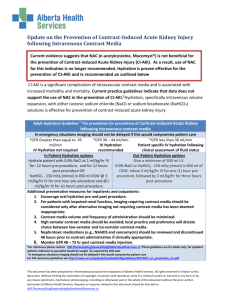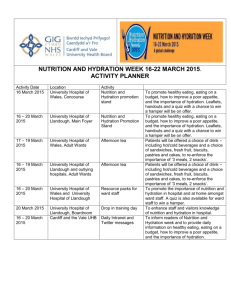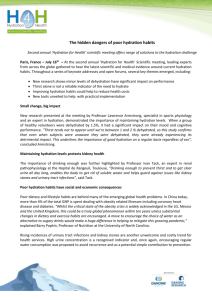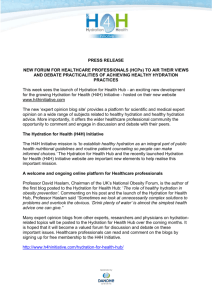Water
advertisement
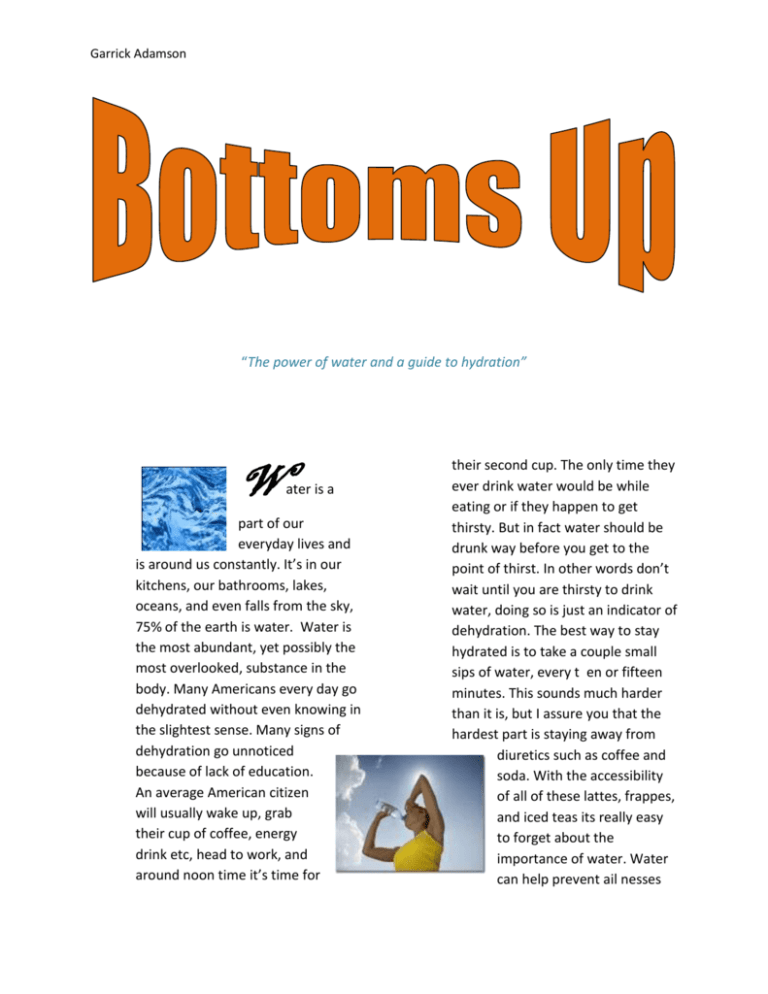
Garrick Adamson “The power of water and a guide to hydration” W ater is a part of our everyday lives and is around us constantly. It’s in our kitchens, our bathrooms, lakes, oceans, and even falls from the sky, 75% of the earth is water. Water is the most abundant, yet possibly the most overlooked, substance in the body. Many Americans every day go dehydrated without even knowing in the slightest sense. Many signs of dehydration go unnoticed because of lack of education. An average American citizen will usually wake up, grab their cup of coffee, energy drink etc, head to work, and around noon time it’s time for their second cup. The only time they ever drink water would be while eating or if they happen to get thirsty. But in fact water should be drunk way before you get to the point of thirst. In other words don’t wait until you are thirsty to drink water, doing so is just an indicator of dehydration. The best way to stay hydrated is to take a couple small sips of water, every t en or fifteen minutes. This sounds much harder than it is, but I assure you that the hardest part is staying away from diuretics such as coffee and soda. With the accessibility of all of these lattes, frappes, and iced teas its really easy to forget about the importance of water. Water can help prevent ail nesses Garrick Adamson such as Exhaustion Constipation Asthma Headaches Diabetes Heartburn Hypertension Joint and muscle pain Immune diseases and Depression Your body is like an engine, and it requires fluids to keep it cool, lubricated, and performing well. It doesn’t matter what you are doing, you need water, lots of it. It is essential that you keep yourself well hydrated before, during and after each and every activity if you want to maintain good performance. Good hydration will also help to avoid early fatigue during outdoor activities. According to Valleywater.net, “Water represents 45 to 60% of an adult's Yes total body weight.” Water intake is different for everyone depending on their lifestyle. The less sedentary you are day by day, the more water your body requires for proper functioning. For example an average competitive athlete should be drinking around a gallon of water a day. Water is lost every day through sweat, urine, and for the more emotional type even tears. And when water is lost it must be replaced. A common misconception is that after a tough workout, the weight lost is fat. Actually what was lost during that grueling workout was nothing but water, in the sports world we call this water weight. In order to rehydrate fully you must drink one and a half time the water lost during a workout or through activity. A trick to improve hydration is to consume salt. Drinks with salt (Sodium) in them help the body hold and want to consume more water. Plain water actually switches off the thirst mechanism, where as sodium will have your body wanting more water! No Garrick Adamson “No you people are drinkin the wrong water” Name of site Url Content Audience Rating Extreme Nutrition http://www.extremenutrition.co.uk/news_and_arti cles/understanding-importance-hydration.php Hydration info and facts Anyone active 1/4 Importance of Hydration http://eatdrinkbetter.com/2011/08/25/water-theimportance-of-hydration/ Waters benefits on the body Adults interested in nutrition 3/4 Wolverine Sports Blog http://wolverinesportsblog.com/2011/03/25/13/ Dehydration in athletes Athletes 3/4 European http://www.europeanhydrationinstitute.org/the_im Hydration Institute portance_of_hydration.html The science of hydration High school 3/4 students and up Staying on TRAC http://trac.uis.edu/2011/04/importance-ofhydration.html Hydration Tips College students 2/4 Livestrong http://www.livestrong.com/article/438279-theimportance-of-hydration/ Athletic performance / Weight loss Anyone Active 1/4 Garrick Adamson Common Myths about Hydration Myth #1: You must drink eight glasses of water a day In reality, fluid needs vary widely, both for individuals and on a day-to-day basis. The Institute of Medicines' Food and Nutrition Board's general recommendation is 91 ounces (about 11 cups) of total water daily Myth #2: It's best to drink like your workout buddy Sweat rates vary greatly among people, especially during prolonged exercise or in hot weather. How much you need to drink depends on how much fluid you need to replace Myth #3: Drink as much water as possible before working out Hyponatremia, a dangerous drop in blood-sodium levels that can be lifethreatening, results from overdrinking--replacing water without adequately replacing sodium lost through sweat. http://www.active.com/women/Articles/4-Common-Hydration-Myths.htm Garrick Adamson The Question Corner! “Come with questions, leave with answers” Q: I am on a sports team and was curious what the best drink used to hydrate is. I usually drink water but I have heard of other drinks that can hydrate better and are healthy. A: Athletes drink water with additives (sugar, salt, potassium, etc) which make it osmotically correct so as to prevent bloating and to allow it to pass through the upper GI tract more quickly than plain water. If sports drinks have too many calories look for something else, though many have just as much calories or more.
